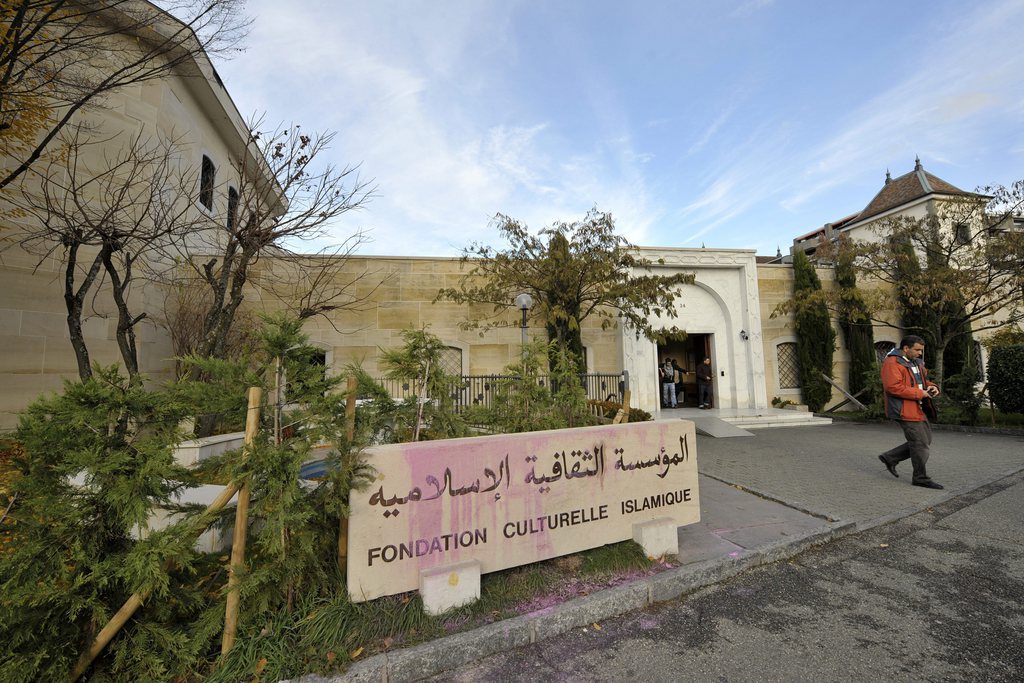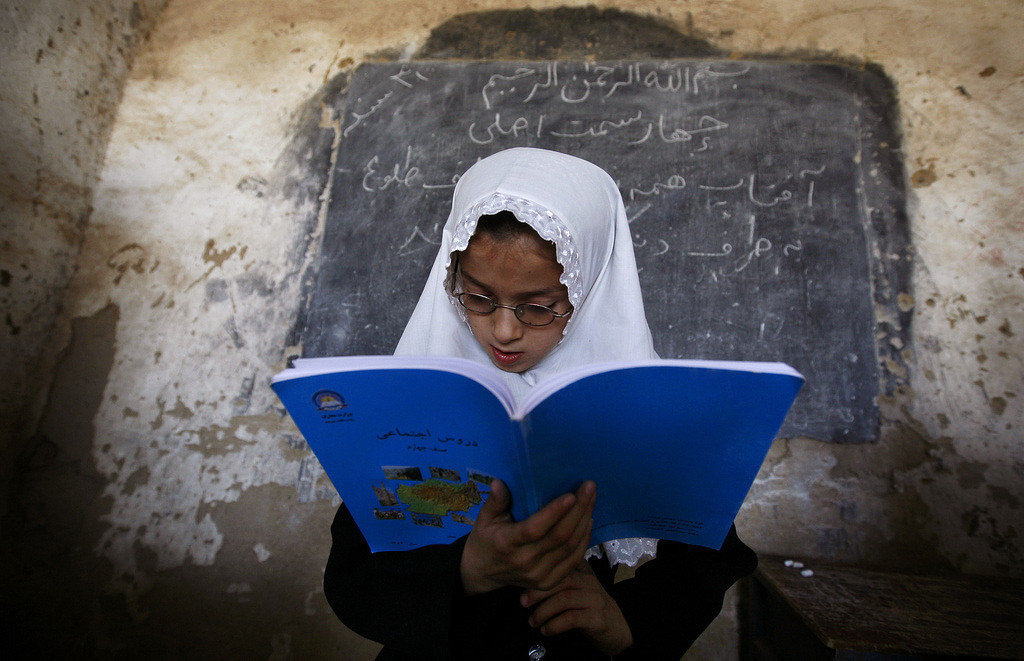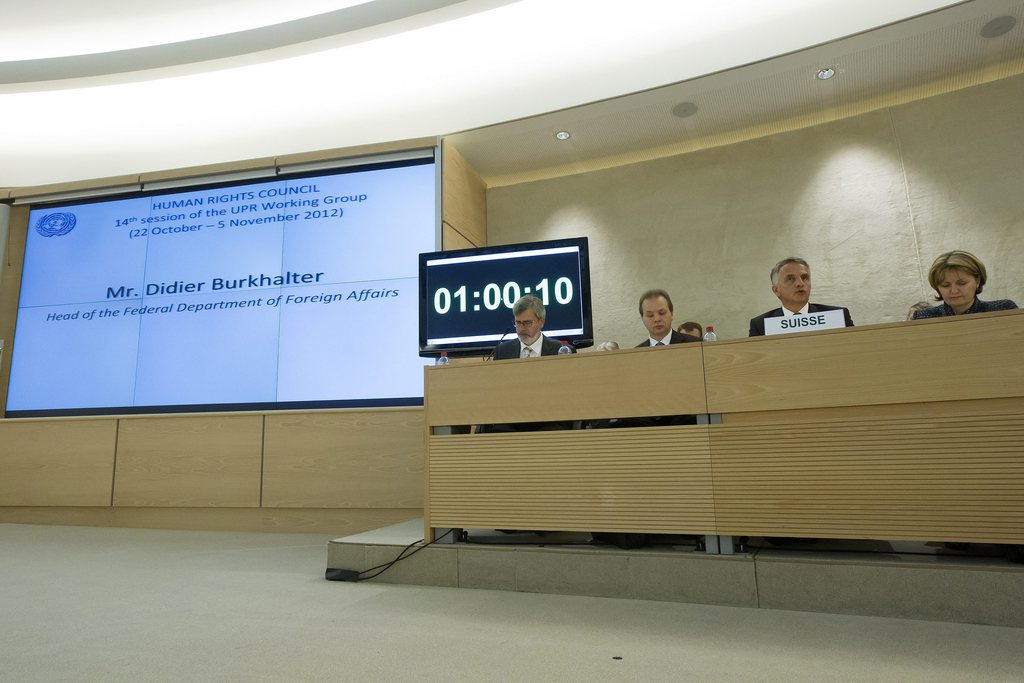UN rights council adopts Swiss report

Switzerland has vowed to improve its human rights record and has accepted 100 suggestions by other states at the UN Human Rights Council. Activists commend the Swiss authorities’ inclusive approach but say they lack “political courage”.
The final report of Switzerland’s second Universal Periodic Review (UPR) – a human rights peer review exercise carried out every four years – was adopted by the 47-member Geneva-based council on Thursday.
Switzerland has agreed to implement 99 out of 140 recommendations put forward by 69 states last October. The adoption of the report follows a consultation process involving the federal and cantonal authorities and civil society to determine which proposals were already covered, and which could be implemented in the next four years.
“The Swiss government believes that the general level of human rights protection in Switzerland is good. But no country – even those where human rights are well respected – can and should be complacent,” Swiss ambassador to the UN in Geneva, Alexandre Fasel, told the council.
“Respect for human rights is a permanent task. Every government and citizen should work on this on a daily basis.”
Among the raft of accepted proposals, Switzerland has agreed to ratify UN conventions on the rights of disabled people and on forced disappearances. It has also promised to work towards reducing wage inequality between men and women, as well as improving the fight against human trafficking, sexual exploitation and domestic violence.
It has also accepted a recommendation to transform the newly created Swiss Centre of Expertise in Human Rights (SCHR) into a proper independent national agency in accordance with the “Paris principles”, which govern the status and functioning of national human rights bodies. The SCHR is currently a five-year pilot project.
The first-ever four-year review exercise of all 193 UN member states began in April 2008. The records of states were examined using a common mechanism, regardless of their size, wealth, military or political importance.
The second four-and-a-half-year UPR cycle began on May 21. 2012. Switzerland’s second review took place on October 29.
Before each appearance the state under review submits a national report spelling out the steps they have taken to implement accepted recommendations from the first review. This is complemented with a UN report and summary of stakeholder information (NGOs, etc.).
The review is facilitated by groups of three states members of the council, or troikas, which act as rapporteurs. Nigeria, Belgium and Costa Rica supervised the Swiss presentation.
During the session, an interactive dialogue between the country under review and the council takes place and later a working report is adopted for each country.
“No domestic support”
But Switzerland has rejected 41 other recommendations, including the ratification of the UN convention on migrant worker rights and national laws ensuring effective legal consideration of economic, social and cultural rights.
It has also refused to introduce general legislation against discrimination or which bans organisations that espouse racist views. It has rejected calls from numerous states to reverse the ban on the construction of new minarets in Switzerland which was passed by Swiss voters in 2009.
The government argues that none of these proposals have sufficient domestic backing to be accepted.
“The ban against discrimination is written into the Swiss Constitution,” commented Luzius Mader, deputy director of the Swiss justice ministry. “The predominant opinion in our country is that the sectorial approach offers a more effective protection than a general law against discrimination.”
But he added that the government is open to new ideas. It has asked the SCHR to prepare a study on existing measures to fight discrimination; parliament has also requested a report from the government on the matter.
“Lack of courage”
A coalition of 47 Swiss non-governmental organisations involved in the second UPR expressed its overall satisfaction with the process and welcomed the fact that the government had treated them as a partner and that the cantons had been included in the decisions.
But it said it regretted that one out of three of the numerous recommendations had been rejected, many due to a simple lack of political will. This was especially the case for the creation of an independent body for complaints against police violence, the inclusion of torture as a penal offence and the systematic separation of delinquent minors and adults held in detention centres.
“The fact that over 12 recommendations linked to discrimination were rejected is problematic,” Amnesty International expert Alain Bovard told swissinfo.ch. “It sends a wrong signal to the international community and to the many people in Switzerland who continue to be discriminated against.”
“Almost all the recommendations requiring legislative changes were rejected. This shows a lack of courage by the government,” the coalition declared in a statement.
Switzerland now has four years to implement the 99 recommendations it has agreed to. It will next defend its human rights record before the Geneva-based council in 2016.
(with agencies)

In compliance with the JTI standards
More: SWI swissinfo.ch certified by the Journalism Trust Initiative













You can find an overview of ongoing debates with our journalists here . Please join us!
If you want to start a conversation about a topic raised in this article or want to report factual errors, email us at english@swissinfo.ch.